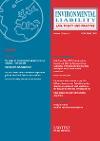Environmental Liability - Law, Policy and Practice

Article
The scope of environmental judicial review in Aotearoa – New Zealand
TREVOR DAYA-WINTERBOTTOM
University of Waikato
This article critically examines the scope of judicial review as a public law remedy across the corpus of environmental statutes in force in Aotearoa – New Zealand. In particular, it interrogates the use of exhaustion of remedies and ouster clauses to limit access to judicial review, procedural requirements that only permit judicial review as a concurrent action with appeals on questions of law, the coherence between statutes that provide for statutory appeals and statutes that rely solely on judicial review, recent limitations on Supreme Court jurisdiction, and whether indigenous concepts of guardianship and stewardship could provide a different perspective on the value of judicial review as a public law remedy underpinning the rule of law for nature.
The 2022 Bonn Climate Conference: negotiation gridlock with fossil fuels on the comeback
ALEXIOS ANTYPAS, BROOKE ELLEN MOORE
Central European University
The authors set out the key issues under discussion at the 2022 Bonn Climate Conference, which took place ahead of COP27. These included the question of energy security in light of the war in Ukraine, and the ambition to meet the 1.5 degree goal, as well as loss and damage, finance, and adaptation concerns. Their conclusion points to an ever deepening rift between developed and developing country parties.
Case Commentaries
High Speed Two (HS2) Limited and the Secretary of State for Transport v Four Categories of Persons Unknown and Ross Monaghan and 58 Other Named Defendants
ROSALIND ENGLISH
Academic Consultant, 1 Crown Office Row
In this case, which involved the application, and grant, of an interim injunction in the ‘unknown’ as well as ‘known’ protester context, the claimants had to demonstrate trespass and nuisance, and a real and imminent risk of recurrence. In granting the interim injunction, Knowles J commented that it was of clear geographical and temporal scope and that injunctions against defined groups of persons unknown are now commonplace. The courts have fashioned a body of law in order to address the issues which such injunctions can raise, and to make sure they operate fairly.
Former executives ordered to pay £80 billion in damages over Fukushima nuclear disaster: an example of what could come for those at the front line of managing risk
ROSS BAKER, NATHAN PENNY-LARTER, ZOE WHITE
Beale & Co, London
This ruling in favour of shareholders centred on whether senior management could have predicted a serious nuclear accident striking the power plant after a massive earthquake and tsunami. The court found that the executives could have prevented the Fukushima disaster if they had exercised due care. The case feeds into the wider requirements for companies and their directors and officers to account for, and meet, environmental targets to take steps to avoid environmental catastrophes, with possibly the unintended consequence of deterring some directors from assuming roles in more inherently risky sectors.
Current Survey
European Union
MARTIN HEDEMANN-ROBINSON
University of Kent, Canterbury
Key Policy Developments October–November 2020
Chemicals
Climate Change
Environment and Health
Waste Management
Environmental Governance
Nature Protection and Biodiversity
Air Quality
Law Enforcement Issues October–November 2020
Water
Waste
Air Quality
Industry and Energy
Nature Protection and Biodiversity
Environmental Impact Assessment
Noise Pollution
Environmental Rights
EU Environmental Legislation Update
